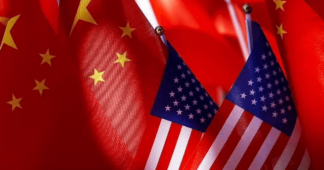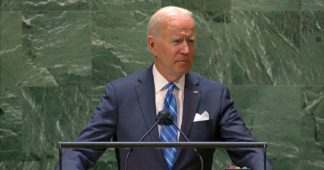“International cooperation is not only in the best interests of all countries, but is absolutely necessary for the survival of the planet.”
By Jake Johnson
U.S. Sen. Bernie Sanders warned Monday that hawks in both his country and China are pulling the two superpowers into a “disastrous cold war” that threatens to undercut the possibility of cooperation against the worsening global climate emergency.
Sanders (I-Vt.), whose home state suffered catastrophic flooding last month, wrote in an op-ed for The Guardian that “if the United States, China, and other industrialized countries do not come together to dramatically decrease greenhouse gas emissions, the world we leave our children and future generations will become increasingly unhealthy and uninhabitable.”
“Now is the time for a radical rethinking of geopolitics to reflect the reality that international cooperation is not only in the best interests of all countries, but is absolutely necessary for the survival of the planet,” wrote Sanders.
Tensions between the U.S. and China have risen steadily in recent years as the two nuclear-armed nations have intensified trade restrictions and repeatedly exchanged warnings and threats over Taiwan, which the U.S. arms. Earlier this year, China voiced outrage over U.S. plans to sell nuclear-powered submarines to Australia as part of a new military partnership.
After U.S. Secretary of State Antony Blinken visited Beijing in June, China’s foreign ministry said the relationship between the two nations was “at the lowest point since its establishment” and “in a downward spiral.” A survey released last week found that 43% of Americans believe it is likely that the U.S. and China will be engaged in “direct military conflict” within the next five years.
In his op-ed, Sanders argued that a deteriorating U.S.-China relationship is disastrous for the world, particularly given that the countries are the two largest contributors to planet-warming greenhouse gas emissions, which are fueling extreme weather that has impacted both the U.S. and China in recent months.
U.S. and Chinese officials revived bilateral climate talks in July, but they did not come to any concrete agreement.
“The science is clear: If the U.S., China, and the rest of the planet do not act with greater urgency to dramatically cut carbon emissions, our planet will face enormous and irreversible damage,” wrote Sanders.
While expressing opposition to China’s treatment of the Uyghurs and other policy actions, Sanders argued that “organizing most of our national effort around a zero-sum global confrontation with China is unlikely to change Chinese behavior and will alienate allies and partners.”
“Most importantly, it could doom our planet by making climate cooperation impossible between the world’s two largest greenhouse emitters,” the senator added. “We need to move in a bold new direction.”
Sanders noted that both the U.S. and China have exploding military budgets, spending close to $900 billion and $300 billion per year respectively—an “insane dynamic,” according to the Vermont senator.
“So here’s a ‘radical’ idea,” Sanders added. “Instead of spending enormous amounts of money planning for a war against each other, the U.S. and China should come to an agreement to mutually cut their military budgets and use the savings to move aggressively to improve energy efficiency, move toward sustainable energy, and end our reliance on fossil fuels,” Sanders wrote. “They should also provide increased support for developing countries who are suffering from the climate crisis through no fault of their own.”
Acknowledging that establishment figures would likely dismiss such a policy recommendation as “naive and unsophisticated,” Sanders responded: “Go talk to the people in Vermont who have lost their homes because of unprecedented flooding and the families in Hawaii who lost loved ones in the recent fires. Go talk to the more than 1 million people in China who have been displaced by catastrophic floods. Go talk to the people in southern Africa who are starving because of the terrible drought and floods they are experiencing or farmers around the world who can no longer grow their crops because of water shortages.”
“Perhaps most importantly, go talk to the hundreds of millions of young people in every country on Earth who are losing hope, wondering whether they should even have children of their own, given the enormous challenges the climate crisis poses for a normal life,” he added. “If we are to save the planet, now is the time for bold action. Let’s do it.”
We remind our readers that publication of articles on our site does not mean that we agree with what is written. Our policy is to publish anything which we consider of interest, so as to assist our readers in forming their opinions. Sometimes we even publish articles with which we totally disagree, since we believe it is important for our readers to be informed on as wide a spectrum of views as possible.











